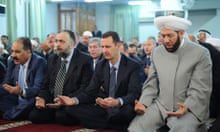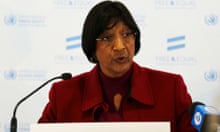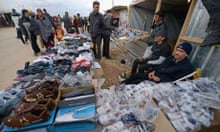The numbers continue to rise – over 4,400 killed in the holy fasting month of Ramadan alone, nearly 2 million refugees now in Jordan and Lebanon, and 7 million inside the country in need of urgent food aid. Syria continues to bleed, its borders are fissuring and the tremors propelled throughout the region – principally to Iraq, Lebanon and Jordan – are no longer a matter of conjecture but of fact.
Officials at Oxfam estimate that 25% of the population of Lebanon is now Syrian. The refugee crisis is disguised because the refugees themselves are dispersed – 80% of them are living outside the camps. Even a windowless garage without running water or drainage is considered a valuable rent, and there is a resistance to being registered as a refugee, for fear that if the regime at home finds out, they could lose their property in Syria. Even so, the United Nations estimates this has become the biggest refugee crisis since Rwanda. For all that, the civil war is slipping down the international agenda.
Barack Obama cancelled on Wednesday a bilateral meeting with Vladimir Putin at the forthcoming G20 summit in St Petersburg, in the full knowledge that one casualty of the slight he delivered to the Russian president would be the declared aim of the resumption of peace talks in Geneva. And no one seems to mind, because Geneva, too, is dead in the water. A good idea, but no chance of coming to pass. The likelihood of getting Syrian rebels to agree on whom should represent them is even slimmer than the substantive issue of negotiating with representatives of Bashar al-Assad. The next international forum to discuss Syria will be the meeting of the general assembly of the UN at the end of September.
At least two Syrian rebel brigades claimed on Thursday that they hit the motorcade carrying the Syrian leader to the mosque where he prayed at the start of Eid al-Fitr. One field commander said they had delivered on their promise of a big operation for Eid. The plain fact is that after the capture of Qusair, the push-back against rebels advancing on the capital Damascus, territorial gains near the Lebanese border and in the city of Homs, Mr Assad must be feeling more confident than he was a year ago of his force's ability to fight back – and that is before one counts on the pro-Assad side of the balance sheet reports that Iran and Hezbollah have established a force of at least 50,000 fighters. They were the cutting edge of the attack on Qusair (Hezbollah's high casualty rate reflected this). Whatever the personal fate of Mr Assad and his family, a force of this size, and possibly double, means that Iran is building the capacity to ensure that it will have a role in determining the future of Syria, independently of what happens on the battlefield or the negotiating table. Iran is by no means alone.
Saudi Arabia, Qatar and Turkey have made similar investments. It is called the Free Syrian Army, but in reality it is a loose collection of militias under a command that is unified in name only. Clashes on the ground between rival anti-Assad forces have grown in frequency. Nor do the rebels' various backers have a common interest: Turkey, while backing the Islamist alternative to Mr Assad, is keen to prevent Syrian Kurds from providing a fresh springboard for the Kurdistan Workers' Party (PKK), especially after Ankara's peace deal with it. But it has produced tensions between the Turkish-backed Syrian National Council, the Free Syrian Army and Kurdish forces. This remains a fight among Syrians, heightened by sectarian divisions. But the European council on foreign relations is surely right to conclude in a report which examines the regional struggle for Syria that the shattered country has become first and foremost a struggle for regional ambitions.
Without the international will to stop this, this conflict has fuel enough to burn for a long time indeed. This time next year we could be reporting what we are today: that one side or another feels it is one battle short of winning a strong seat at the negotiating table.



